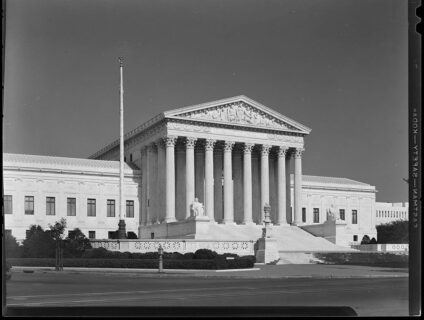
Podcast
Religious Liberty and the Courts
A 75-minute discussion between scholars with a live teacher audience, this program explores the impact of several key US Supreme Court cases on the definition and limits of religious liberty in America, originally broadcast on 3 October 2015.
Jeff Sikkenga (Ashland University) and Matthew Franck (Witherspoon Institute) will discuss three recent Supreme Court cases that dealt with religion: Burwell v. Hobby Lobby; Abercrombie and Fitch v. the Equal Employment Opportunity Commission; and Holt v. Hobbs.
In the Hobby Lobby case the court ruled that closely-held for profit companies were exempt from provisions of the Affordable Care Act that violated the religious beliefs of the companies owners.
The Abercrombie case concerned the decision of Abercrombie and Fitch not to hire someone because they wore a head scarf, which violated the company’s dress code. The court ruled that the job applicant did not have to specifically ask for the company to accommodate her religious practice (the head scarf) in order for the job applicant to be protected by Title VII’s prohibition on the basis of religion. The Court’s opinion may be found here.
In Hobbs v. Holt, the Court ruled that prison authorities could not prevent an inmate from growing a beard for religious reasons because doing so violated the Religious Land Use and Institutionalized Persons Act. The Court’s decision may be found here.
Matthew J. Franck is the Director of the William E. and Carol G. Simon Center on Religion and the Constitution at the Witherspoon Institute, Princeton, New Jersey. He is Professor Emeritus of Political Science at Radford University, in Radford, Virginia, where he taught constitutional law, American politics, and political philosophy from 1989 to 2010, was Chairman of the Department of Political Science from 1995 to 2010, and received the Radford University Foundation Award for Creative Scholarship in 2001. He is also Visiting Lecturer in Politics at Princeton University.
Jeffrey Sikkenga is professor of political science at Ashland University, adjunct fellow of the John M. Ashbrook Center and senior fellow in the Program on Constitutionalism and Democracy at the University of Virginia. He has taught undergraduate and graduate courses in political thought, the American Founding and American constitutional law. He is deeply interested in the relationship between politics and religion in liberal democracy and America in particular.
This Webinar is the second in a series of three on Religion in American History and Politics. The third will occur March 12, 2016. David Tucker and Stephen Knott will discuss the views of Jefferson and Hamilton on religion and politics.

